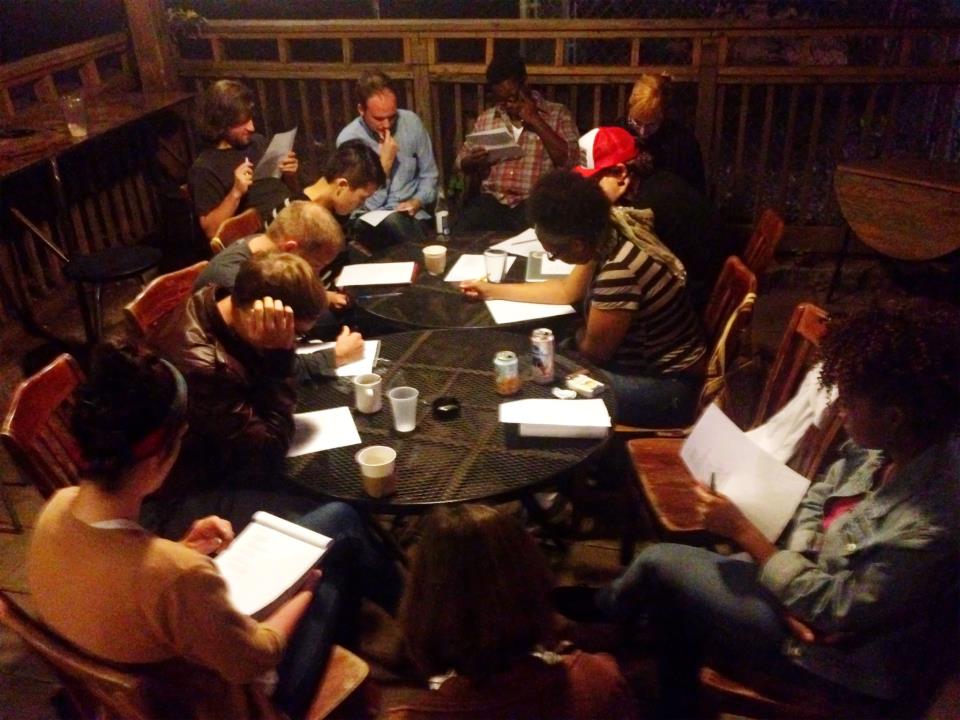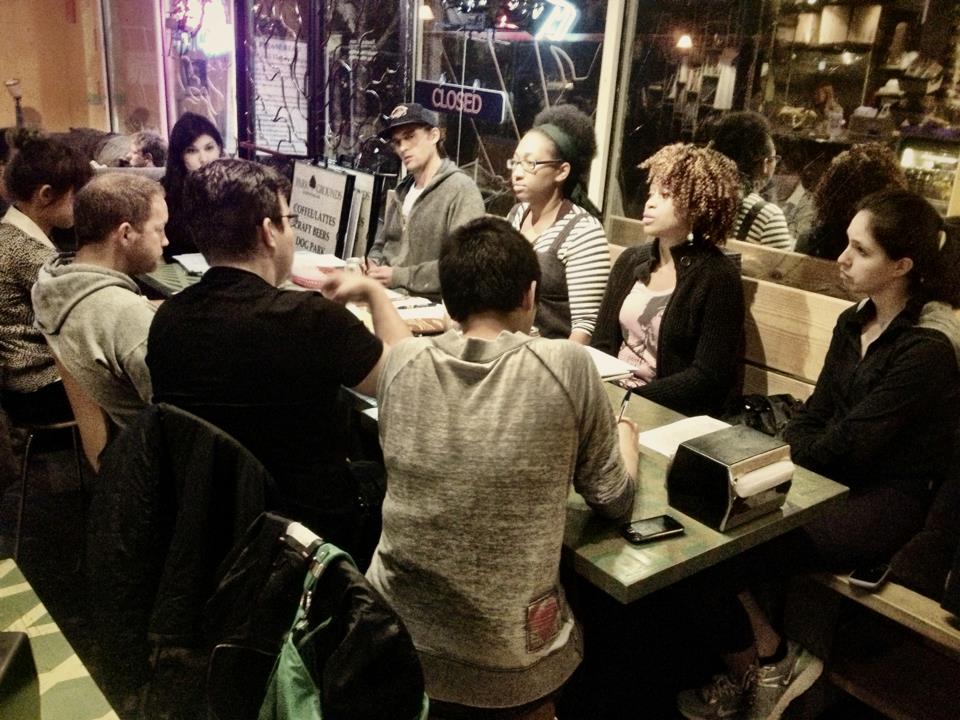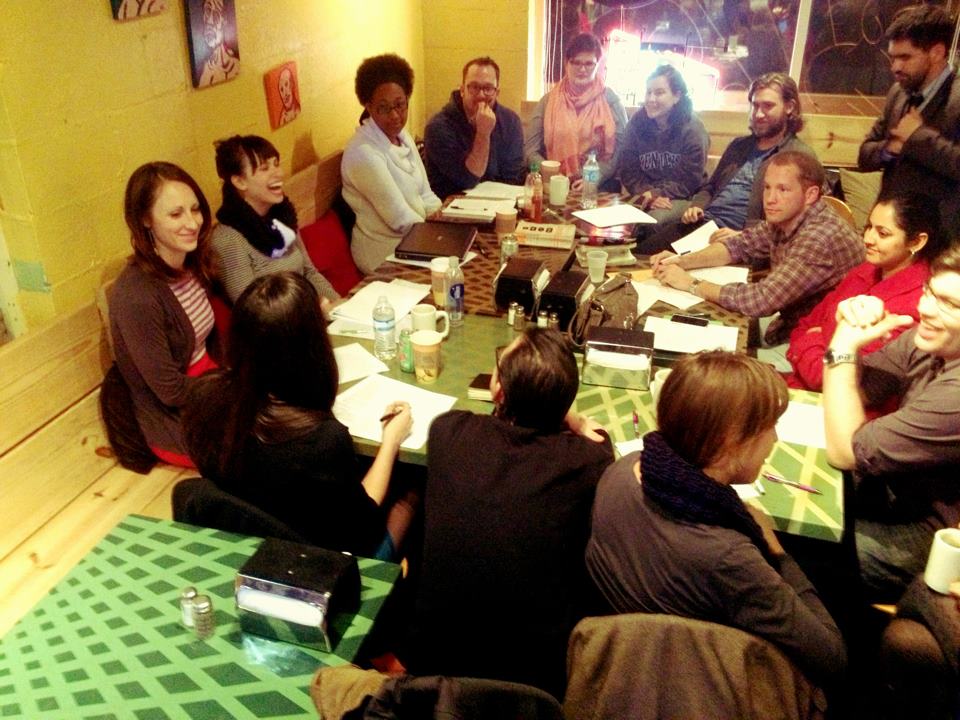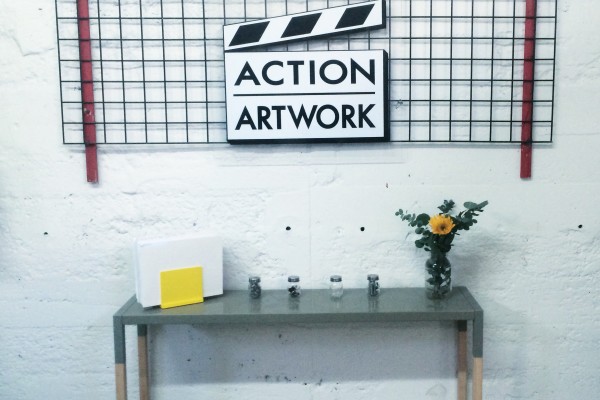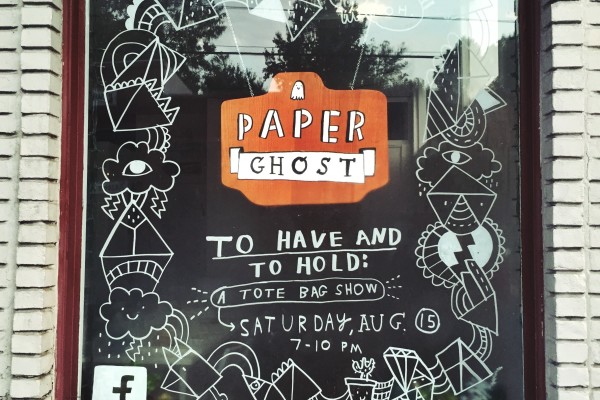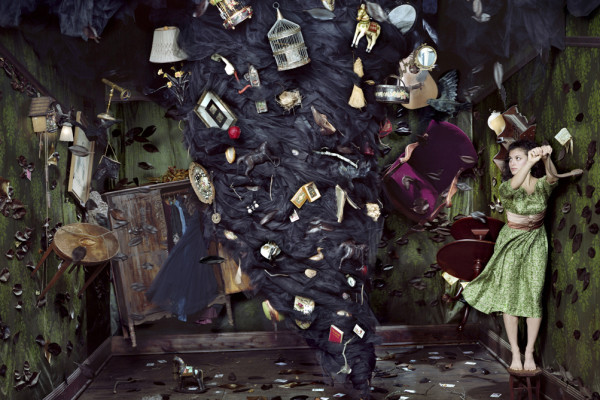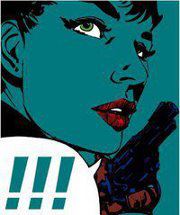 Living in a city where writers are spread out can feel rather lonely—especially in a city where publishing is not a main industry. Atlanta was in need of a community of writers, and Melysa Martinez saw that opportunity in 2010 and took it by the horns. She’s amazing like that. Enter Kill Your Darlings—a community of writers who meet every other week at ParkGrounds to review each other’s work, chat with other like-minded writers and well, drink coffee. The workshops welcome writers from all paths, and around 4-5 pieces are peer-edited every meeting.
Living in a city where writers are spread out can feel rather lonely—especially in a city where publishing is not a main industry. Atlanta was in need of a community of writers, and Melysa Martinez saw that opportunity in 2010 and took it by the horns. She’s amazing like that. Enter Kill Your Darlings—a community of writers who meet every other week at ParkGrounds to review each other’s work, chat with other like-minded writers and well, drink coffee. The workshops welcome writers from all paths, and around 4-5 pieces are peer-edited every meeting.
While Martinez has moved away from Atlanta to pursue other opportunities, she still has her hold on Atlanta as she participates from far away while her successor, Kory Oliver, leads the workshops and events. Kill Your Darlings has grown and evolved over the past two years, and has been instrumental in Atlanta’s thriving literary scene.
In the final installment of the CCATL Literary celebration, we talked to Martinez about taking a risk, some advice for writers and missing Atlanta.
CC: Happy National Writing Month! Tell us about Kill Your Darlings’ inception.
Melysa Martinez: Kill Your Darlings ATL started in June 2010 on the cusp of [me] graduating college and realizing I would no longer have peer workshops available to me. I wanted to make sure my new free time would be spent productively, and not partying. The first workshop had more than 10 people in attendance. I realized immediately that I wasn’t alone in my desire for like-minded peeps to share with and learn from. I didn’t stop partying, of course, but when I did it felt like a deserved break from writing.
CC: Kill Your Darlings can be nerve-wracking for a new member. How would you describe a workshop?
MM: Going alone to a gathering of unknown faces can certainly be nerve-wracking, but honestly, the workshops are almost as awesome as stumbling into a litter of puppies. (Almost.) Outside of getting feedback on pieces, I think the best part of the workshops is getting to know more writers and making genuine friends in the process.
At the workshops, we stake a table, sit down, introduce ourselves, and then those who have a piece to workshop hand out hard copies, and everyone reads to themselves, make notes on the page, and then when everyone is done, people take turns giving their feedback. Then we repeat with another person and their piece. Not everyone reads, and you don’t have to give feedback on every piece, but there’s always something learned during the exchange of ideas. Moreover, there is always the exchange of smiles and encouragement.
CC: How do you think these workshops have helped your writing as far as feedback?
MM: Personally, it’s been a combination of growing a thicker skin, humility, as well as confidence and believing in one’s self. I’ve walked in with pieces I thought were terrible, and was surprised when others liked it. In contrast, I’ve brought in pieces I thought were great and people just tore it a new one. But I welcome the honesty.
I think writers should listen to feedback. Not necessarily every detail people suggest, but if eight out of 10 people tell me an opening paragraph needs to be reworked, that’s a strong ratio that cannot be denied. A workshop is your first audience, and if your workshop peers can’t stomach the opening paragraph, chances are neither will an agent, a publisher, or readers. I sincerely believe our workshop peers are well-wishers and want to see their peers succeed. In at least, their suggestions are worth considering.
CC: What’s your favorite place to write in Atlanta?
MM: Nothing could ever come close to sitting on my back deck under the table’s umbrella enjoying the day’s heat or cold (unless it was raining, I was always writing outside). I would chain smoke while I wrote, which usually meant lighting a cigarette and then putting it down on the ashtray where it would burn out while I paced back and forth. When I wasn’t on my deck, I was usually at Joe’s Coffee Shop in East Atlanta or ParkGrounds in Reynoldstown, but going there was usually an invitation to run into other writers, which could result in more talking than writing, so I usually stayed home writing on the deck while my dog sunbathed.
CC: What inspires you?
MM: My many mistakes. The achievements of my icons. The perfect sentence.
CC: What are some Atlanta things that you miss?
MM: Honestly, the people. As an adult, I’ve never lived in any other major city other than Atlanta, so I really have no room for comparison, but Atlanta is a city of heart, and I don’t know that any other city will live up to the love I have for and received from Atlanta. My unfounded belief is that cities like NYC or LA are competitive, but I always felt that my friends and even acquaintances in Atlanta genuinely supported one another and looked forward to see others flourish. I miss the hugs of my friends when I have a bad day, and the cheering over drinks when we had a good one.
CC: Now that KYD is under new management, how do you see it evolving in the Atlanta literary scene?
MM: My good friend Kory Oliver has taken over the workshops in my absence, as well as planning upcoming events, and I don’t think I could have picked a better person. Every time I see Kory, he has a book in his hand. We could be drunk at a bar on a Saturday night, and he will open whatever book he has and read us a poem out loud, or open it to a page and say, “Read here to here.” He loves literature, and he loves people, and those are two things I think are crucial when running a literary group.
Three of my many flaws are that I’m a perfectionist, over-analytical, and anxious, so while I have many ideas, it often takes me forever to get anything done because I shut down. Kory, however, is fearless and enjoys putting himself out there and trying new things, so I think he is great for his role because he won’t waste time thinking about things, and instead will execute them without fear of the end result.
There are way more players in the local literary scene than there were three years ago, so I think having someone like Kory who is willing to try something new is crucial to not losing the interests of Atlantans, in addition to having contributing writers like Dan Cohen and Andrew Leidner to speak with those in the local writers community in order to make others aware of their presence and hopefully bring the scene closer together.
CC: What are your thoughts on the current state of book publishing and stores in Atlanta?
MM: Ooh, good question! Although, I’m pretty ill-informed on this. Aside from Ben Spivey’s Blue Square Press, Matt DeBenedictis’ Safety Third Enterprises, Bruce Covey’s Coconut Press, and Amanda Mills’ Atlanta Zine Library. I’m not all-too familiar with small publishers based in Atlanta outside of those, but even those were founded during the last three years or so, so they are relatively new and still growing, which is great to see people taking chances and not relying on big-time publishing houses in order to get the works of talented writers out there in the community. And then we have Laura Straub of Vouched Books promoting small press books at local events, which is awesome. I think so many people in the scene are having fun with it all, and it’s essential.
Allen Ginsberg said in an interview of him and some of the other (now famous) beatnik poets, “We didn’t expect to succeed and we were just having fun with each other.” I think that’s important: to have fun together. And I think it’s easier to rise together when you’re having fun and are a collaborative force, than to be alone with your words and have no one to hear you.
I love that Bound To Be Read books in East Atlanta has workshops and book clubs and supports local writers, while A Capella Books brings big names to read in Atlanta (Bret Easton Ellis, Nick Hornby), which is always a great treat for us fans. Charis Books also has events, workshops, readings and the like. I was saddened when Outwrite Books closed, but by no means discouraged.
Things change, sometimes for the worst, but there will always be a group that will try and fight the odds and succeed at it. I believe in the Atlanta literary community prevailing at all costs.
CC: Do you have any advice for writers?
MM: You have to at least try. Seriously. Forget about the outcome and just put yourself out there and give it your all and have fun in the process and take your time and soak it in and vomit all you need to say to the world. Write it down. Show it to a friend. Read it before an audience. Share it with someone. Don’t keep it inside. Nothing good comes of keeping it all inside.
CC: What’s next for Kill Your Darlings?
MM: Our free workshops will continue at ParkGrounds on the first and third Monday of the month, followed by drinks at 97 Estoria after. Kory and I are in the process of planning some 2013 events, with Kory at the helm of a craft talk in the spring. Collectively, Kory, Dan, Andrew, myself, and whomever else is interested, will continue to interview local writers and literary groups for the website in hopes of bring exposure and make the community closer. On my end, I’ll be starting a Kill Your Darlings Las Vegas, because, alas, my ATL friends aren’t out here, I’m lonely, and on the brink of madness. Here’s hoping LV peeps are as cool and filled with heart as those in ATL.

